I knew and loved Robert Towne for many decades, but especially during the early to mid ’90s, when we were close and in semi-frequent contact. I really did love him. I loved his voice, his eyes and that wonderful sounding name. I must have visited his Pacific Palisades home six or seven times during our relationship heyday. And I loved the smell of his expensive cigars.
Bob was a kind, wise, witty, friendly, congenial fellow…always candid and quietly caustic at times, and a real human being. I loved his slightly sad eyes, and the flickering of odd feelings that you could read or sense and his sardonic, vaguely bitter view of this and that Hollywood player…the games, the letdowns, the vague betrayals. And now, after 89 years of hunger and struggle, he’s gone. I’m not the tearful type, but I’m in tears about this.
Towne will always be best known as the Chinatown guy, but let no one forget that he was a highly commendable director-writer (Personal Best, Tequila Sunrise, Without Limits, Ask the Dust), a great singular screenwriter with a voice (The Last Detail, Chinatown, The Yakuza, Shampoo, Marathon Man, Greystoke: The Legend of Tarzan, Lord of the Apes, The Two Jakes, Days of Thunder, The Firm, Love Affair) and a brilliant uncredited pinch-hitter (Bonnie and Clyde, Drive, He Said, The New Centurions, The Godfather, The Parallax View, The Missouri Breaks, Marathon Man, Heaven Can Wait, Reds, Deal of the Century, Swing Shift, 8 Million Ways to Die, Tough Guys Don’t Dance, Frantic, Crimson Tide).
Towne understood the shrewd power of refrain — planting a thought or a line or an idea in the first act, and then returning to this thought, line or idea in Act Three. The way they mean something at the first hearing, and something more at the end of the film. I once attended a lecture he gave at the old Academy, and he explained the refrain thing at length.
All my life I’ve loved the way Walsh, one of Jake Gittes‘ assistants, claims to have overheard an angry Noah Cross mentioning the words “apple core”, and then we learn an hour or so later that the term is actually “albacore,” as in the Albacore Club. That’s Towne in a nutshell.


Posted on 2.16.20: From the early to mid ’60s, director-screenwriter Robert Towne had a passionate, occasionally troubled relationship with dancer-actress Barrie Chase, who was the daughter of Red River screenwriter Borden Chase. In 1966, things came to an end when Chase decided to wed Swedish actor Jan Malmsjo.
According to Sam Wasson‘s “The Big Goodbye: Chinatown and the Last Years of Hollywood“, Towne and Chase’s big breakup scene happened high in the Hollywood hills. Here’s page 89:
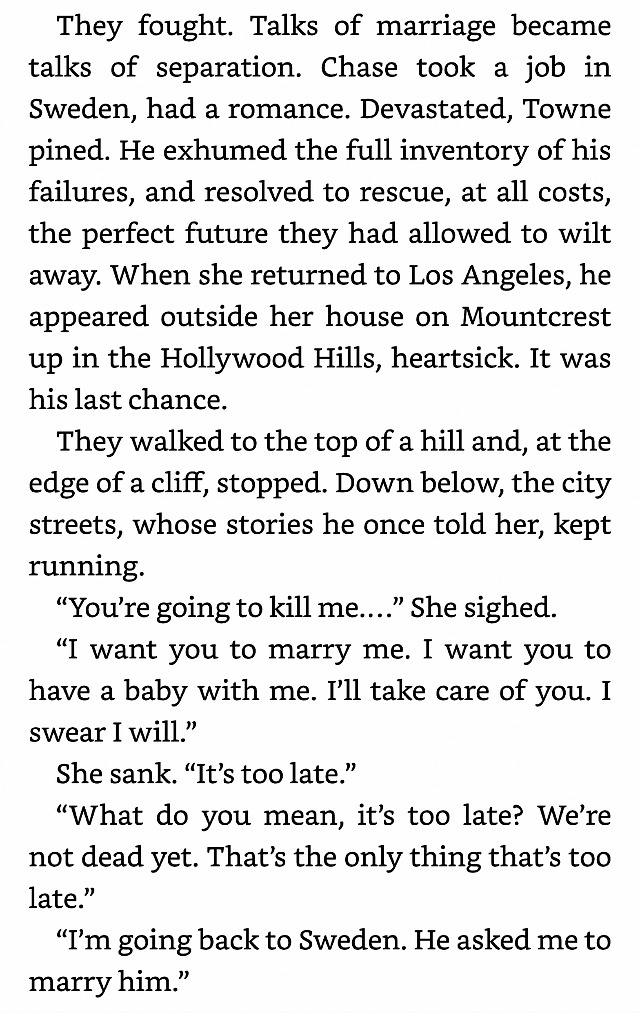

Although Warren Beatty obtained a co-writing credit on Shampoo (’75), Towne is the primary author. He worked on it for years. Here’s the final scene between Beatty and Julie Christie (i.e., “George Roundy” and “Jackie Shawn”). It happens on a hilltop somewhere in Beverly Hills.
Christie: “You’re going to kill me…”
Beatty: “Honey?”
Chrstie: “What are you trying to do?”
Beatty: “I want you to marry me. I wanna take care of you. I want you to have a baby with me. Hey, I know I’m a fuck-up but I’ll take care of you. I’ll make you happy — I swear to God I will. (Two or three beats.) What do you think?”
Christie: “It’s too late.”
Beatty: “Whaddaya mean ‘it’s too late’? We’re not dead yet. That’s the only thing that’s too late.”
Christie: “Lester’s left Felicia. I’m going [with him] to Acapulco on a 4 o’clock flight. He’s asked me to marry him.”
Beatty: “Oh…honey. (Gently weeping.) Honey, please. Please, honey. I…I don’t trust anybody but you.”
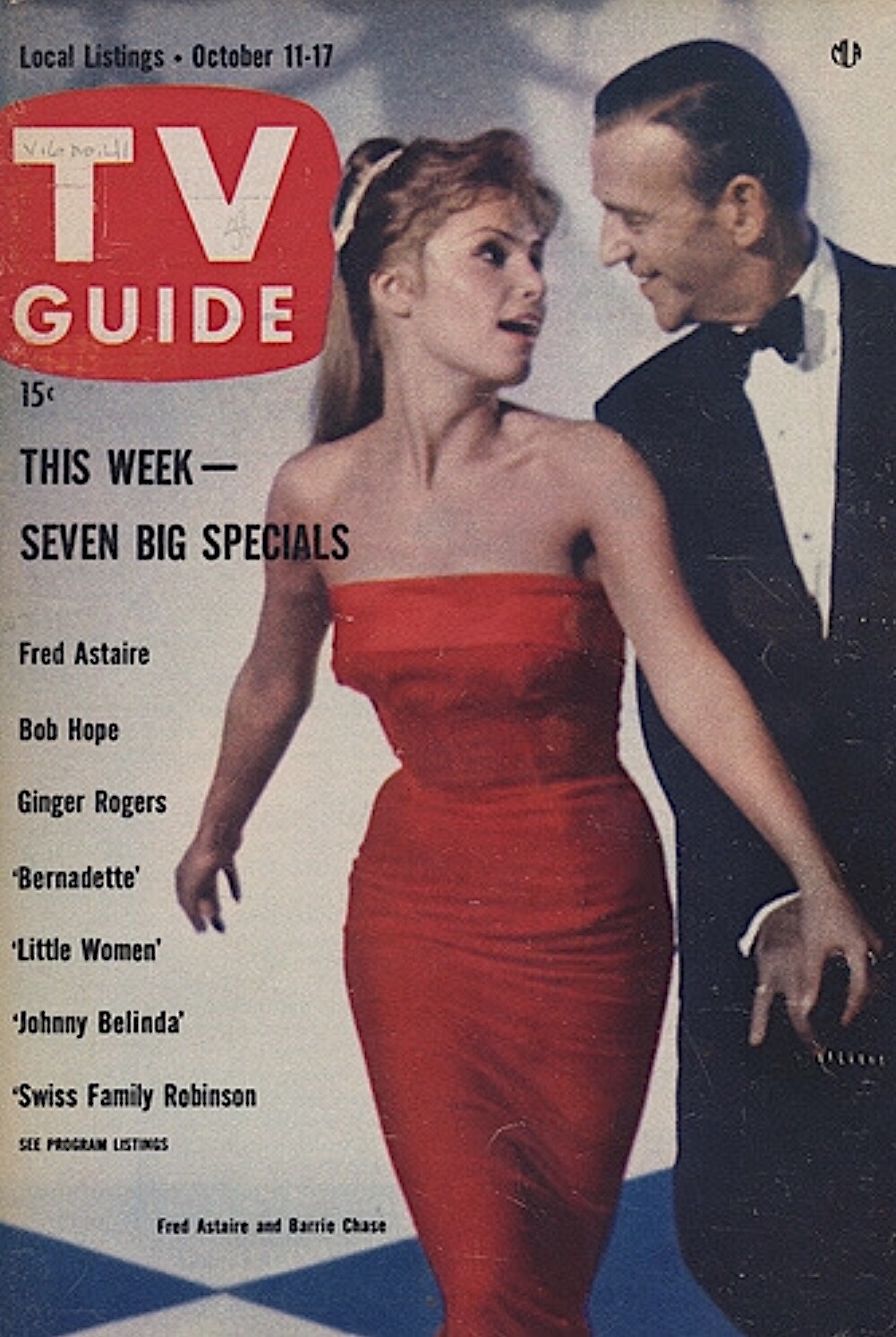
“Towne Tangle,” posted on 2.12.20:
Speaking as an old-time journalist acquaintance of Robert Towne, whom I occasionally visited and spoke to during the early to late ’90s, I felt a bit jarred by a 2.12 N.Y. Times review of Sam Wasson‘s “The Big Goodbye.” Specifically by a statement written by Mark Horowitz, to wit: “No Polanski, no Chinatown.”
The thought is that Towne’s screenplay of Chinatown (of which there were many, many drafts) would have stayed a screenplay without Polanski’s input. He and Towne collaborated for several weeks, during which time Polanski insisted on cutting away much of the sprawl and specificity of Towne’s 1937 detective yarn, as well as using as a dark, downbeat ending.
As Chinatown production designer Richard Sylbert once remarked, “The point is the girl dies…that’s [Roman’s] whole life.” Horowitz writes that Sylbert might have added, “And the monsters win.” In Towne’s original Chinatown drafts Evelyn Mulwray doesn’t die and in fact kills her father, the evil tycoon Noah Cross.
I called Towne a short while ago to ask if he has anything to add or qualify or dispute. He said a few things but under the cloak of privacy. It’s obviously Towne’s call to speak out or be silent, but I were in his shoes I would send a response to the N.Y. Times. I can at least state that from his perspective the “no Polanski, no Chinatown” equation is a less than fully comprehensive summary, but I hope Towne chooses to post his recollections in some specific, chapter-and-verse fashion before too long.
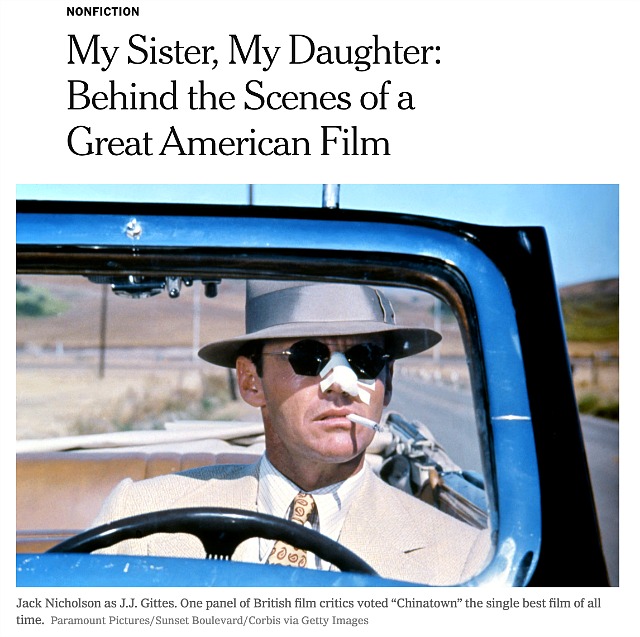
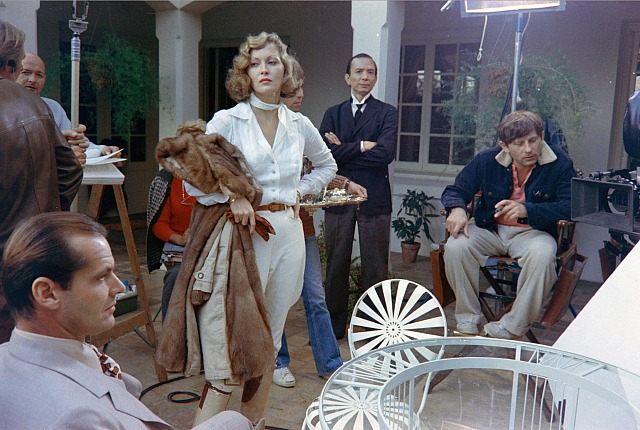
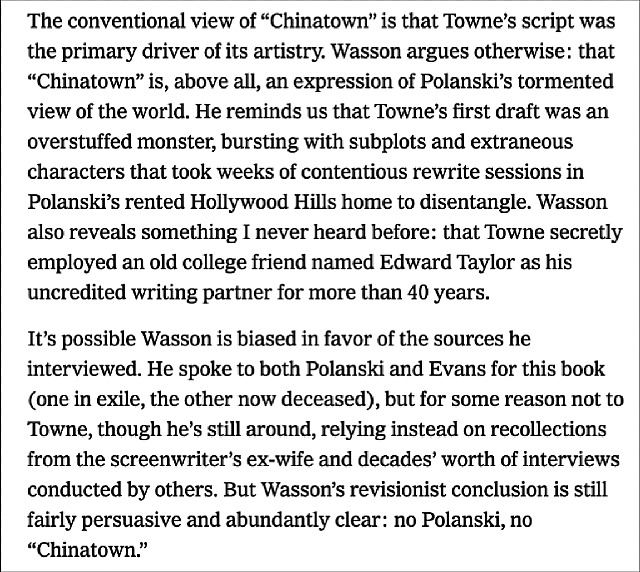
HE’s Bob Hightower: “It was reported recently Towne was writing a CHINATOWN prequel series for cable or streaming… the obits don’t mention that.
“The third film in his CHINATOWN trilogy, SMOG, didn’t get made because THE TWO JAKES tanked. The three were to be about water, oil, and smog — how LA was ruined. SMOG would have been about the deliberate destruction of the efficient southern California trolley system (like others around the country) so that after factories converted back to civilian products after World War II, GM could sell more cars and buses and Firestone more tires. Those two companies bought the trolley systems and deliberately caused them to fail.
“WHO FRAMED ROGER RABBIT deals with ther same saga, in a comedic way.”
